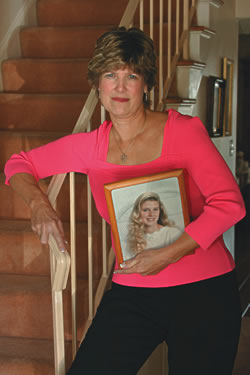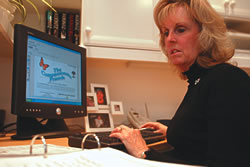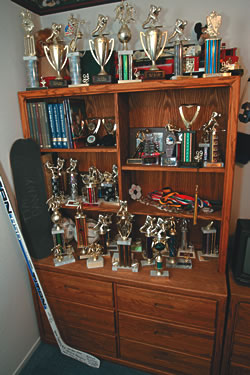EAT, DRINK & PLAY - ENTERTAINMENT
Finding the Joy Again
These Local Moms have Lost Children, but not their Spirit
December, 2005 - Issue #14
 |
The table is festively set. Candles softly glow. Brightly wrapped gifts lay waiting to be opened. Sumptuous aromas beckon from the kitchen.
The family is gathered. Everyone is there - all except for those precious children that are missing. Car crashes, illness, accidents, murder, suicide, whatever the reason that took them away, they are forever gone.
This is a daunting daily challenge, to go on with life after your child has died. It is definitely not the order of how things are supposed to be.
Day-to-day living is hard enough, but what about when the holidays roll around and the rest of the world is in party mode?
How do these families carry on, and even manage to enjoy the season once more?
Three local mothers describe that difficult journey...
"Over time we learn to survive it and move on, and to some extent enjoy it again, but that pain never ever goes away or leaves you, especially during holiday times," said Diane Briones, whose 20-year-old daughter Michelle died in a single car collision on Oct. 11, 1997. (It is thought that Michelle may have lost consciousness while driving and crashed into the freeway guardrail.)
Making modifications and establishing new holiday rituals play a significant role in the sorrowful readjustment. For the Briones family, "downsizing" the holidays has been a must, as is not using their old, familiar ornaments. Instead, like many parents who have lost children, they create an angel tree, symbolic of their child's heavenly presence.
Giving away an article of Michelle's jewelry or one of her pretty, barely-worn dresses has become a meaningful part of the holidays now, too, Diane said.
"I know it would make her feel good," she stated.
Indeed, such acts of kindness would have no doubt pleased Michelle. A budding community activist, she was a former Santa Clarita Valley Safe Rides volunteer who had also helped thwart several youth suicides. A science whiz, her future plans included becoming a doctor.
"She was just a good-hearted kid and I think that's what I miss the most about her, her gentle spirit and love of life," Diane said.
For the first few years following Michelle's death, Diane could not bear to send out holiday cards but eventually she resumed doing so - and still adds Michelle's name to the card.
"It keeps her alive in our hearts and that really helps," the mother said.
It was The Compassionate Friends that cradled Diane and helped her survive Michelle's death. The international, self-help bereavement support organization embraces families that have lost children (and siblings) from any cause, at any age.
"Compassionate Friends, for me through the years, was probably the one thing that saved me," said Diane, who serves as the Santa Clarita Valley chapter leader.
That support is something she now returns to others who walk through TCF doors, families new to this misery.
"It's a club no one ever wants to belong to," Diane says of TCF. "But being part of it, I feel I'm giving back to others and I can let my daughter know she did not die in vain."
Diane acknowledges that this will be an extra painful holiday season as her brother recently died following a brief, sudden illness. The siblings were extremely close.
"Unfortunately his passing has brought up a whole lot of the past for me," she said. "But I know I'll get through it because I got through it once."
Assisting Diane at TCF is Alice Renolds, a Canyon Country mother who tragically lost two of her three sons on Feb. 17, 2000.
 |
Alice recalled the first Thanksgiving without her boys at the table - and an epiphany she had during dinner. This realization would be her salvation.
As she sat there, she asked herself, what was there to give thanks for? Two of her beloved children, each with so much to live for and experience were dead.
Then came an answer from within: She should be thankful that Tim and Danny had been alive and given their family love and lasting memories to cherish.
It was on that first Thanksgiving that Alice put votive candles by Tim and Danny's seats. During dinner, family members took turns recalling favorite memories of the boys. Each laughed and cried.
"It was very touching...things I had not even heard our relatives talk about before. It's unique and it's healing at the same time," Alice said of that continued rite.
When you've buried a child, or lost any close family member, the first year is always hardest, and therefore making new traditions and norms is very therapeutic, Alice said.
"Especially the first year, it was too heart-wrenching to dig out those Christmas trees and ornaments and do all the things we did as a family," she said. "We found that it was best to go away, so we went to Las Vegas with our son and his daughter."
Not all relatives will agree with this change in traditional holiday plans but you have to do what feels right for you, Alice added.
Other new customs she recommends for fondly remembering one's child and sharing holidays "together" include: Putting up their Christmas stockings, lighting their favorite menorah or writing notes to them. Same for packaging up a few of their belongings, then opening them up on Christmas morning (or on a night of Hanukah, Kwanzaa, etc.) and reliving memories of them.
Quite understandably, decorating the home can be emotionally difficult when a child has died, but it is especially important to do so when there are other children still present in the home, Alice said.
"They've lost a brother or a sister and their whole life has changed for them. They still need those holidays," she affirms.
Now grandmothers, both Diane and Alice agree that while new life in the family can never replace their children, it does help diffuse some of the heartbreak and bring more love to their hearts and homes.
"Now I have a future with that grandchild and it really puts a glow into the future," Alice said.
For Stevenson Ranch resident Lori Parker-Gladstein, the holidays became extremely difficult on Nov. 20, 1993.
On that day that her 8-year old daughter Nicole was kidnapped, raped and murdered.
A brunette pixie that loved laughter and softball, Nicole had been plucked from outside her father's Woodland Hills apartment door while playing with a ball and mitt. Her convicted killer, a Middle Eastern immigrant named Hooman Ashkan Panah, remains on Death Row at San Quentin.
Lori recalled how after Nicole's murder she needed a dress for the funeral, and therefore went shopping for one. This was around Thanksgiving and by then the mall was holiday-decorated to the 9's.
The outing was an excruciating experience for the brokenhearted mother.
"I saw the children lined up to sit on Santa's lap, at which time I told my present husband that we needed to leave," she said. "I had an extreme anxiety attack as Nicole was the only one of the my children that still believed in Santa."
To this day Lori cannot go to malls during the holidays so she shops online or from stores not located within malls.
Times were bleak after Nicole's murder but the ability to enjoy life did eventually return to her family.
 |
Now as with every year since her death, Nicole's angel tree sits upstairs in her family's home. Along with the heavenly adornments are various hand-made ornaments, all gifts from her girlfriends and Brownie partners. It is a special sight that warms Lori's heart.
Another source of comfort for Lori is The Nicole Parker Foundation for Children, a non-profit volunteer organization that she started after her daughter's death. The group raises money for mentally and sexually abused children treated by the Child Advocacy Response Evaluation Services (CARES) Team at Childrens Hospital, Los Angeles. Funds are also raised for Parents of Murdered Children (POMC), a national non-profit offering emotional support, education, prevention, advocacy, and awareness to families and friends who have lost loved ones to violence. (POMC greatly helped Nicole's family after her death.)
For Lori and her family, the rewards from the foundation are gifts that keep on giving.
"My daughter may not be alive, but her name and memory always will be," she said.
To all families that have lost children, Lori reassures that as time passes, the pain does lessen. The key to this process, as all three mothers have realized, is found in focusing on your blessings, not dwelling on what you have lost.
"Once they can contain their loved one in a place in their heart, rather than having the death overwhelm their life, it is easier to function," Lori said.
An outdoor holiday tradition that helps aggrieved families is The Compassionate Friends' worldwide candle-lighting ceremony. Slated for December 11, the service honors and remembers deceased children around the globe as well as helps families express their love for that child and feel close to them. For more information about the ceremony or The Compassionate Friends call Diane Briones at 252-4654. You may also go online to www.compassionatefriends.org.
Additional information about the Nicole Parker Foundation may be found at www.nicoleparker.org.
|
||||||||||||||||||||||||||||





